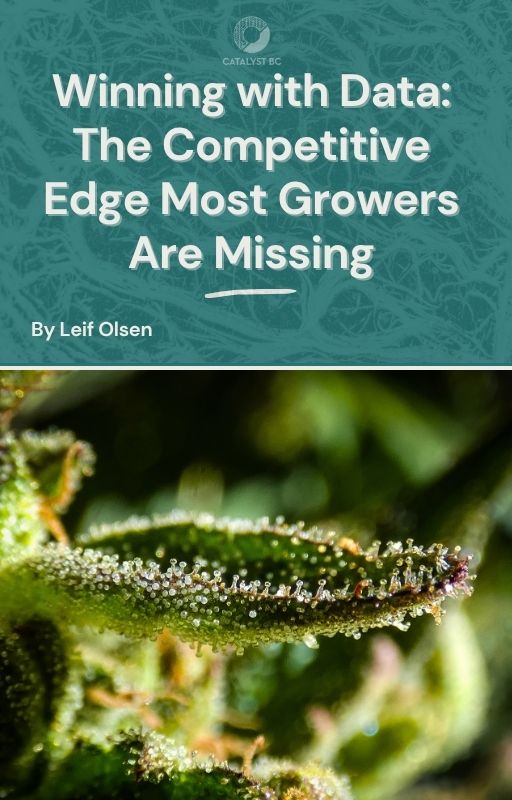Estimated reading time: 13 minutes
Table of contents
- Introduction
- Understanding the Importance of Cannabis Operational Procedures
- Developing Cannabis Operational Procedures
- Cannabis Compliance Procedures: A Critical Component
- Cannabis Workflow Optimization
- Cannabis Best Practices in Operational Procedures
- Embracing Cannabis Best Practices
- Implementing and Monitoring Cannabis Operational Procedures
- Real-World Applications and Case Studies
- Actionable Steps to Write Cannabis Operational Procedures
- The Future of Cannabis Operational Procedures
- Conclusion
- Cannabis Operational Procedures FAQs
- Additional Resources
- Free eBooks For Cannabis Business Success
- Latest Articles
Cliff Notes: Cannabis Operational Procedures
Objective: Develop clear and comprehensive cannabis operational procedures to streamline operations, ensure compliance, and optimize workflows.
Key Components:
- Cannabis Operational Procedures: Documented guidelines for daily operations.
- Cannabis Compliance Procedures: Protocols for regulatory adherence.
- Cannabis Workflow Optimization: Strategies to enhance efficiency.
- Cannabis Best Practices: Standardized methods for consistent performance.
Contact our cannabis consultant team to assist in developing your SOPs and prepare to define objectives, engage stakeholders, document processes, implement, and continuously review procedures. Explore our services or contact us today for a Complimentary Consultation.

Introduction
Well-crafted Cannabis Operational Procedures are critical for ensuring consistency, quality, and compliance. These procedures, often referred to as cannabis SOPs (Standard Operating Procedures), form the backbone of your operational framework. They guide day-to-day activities, mitigate risks, and optimize workflows. In this comprehensive guide, we will explore the importance of writing robust cannabis operational procedures, provide strategies for developing them, and offer best practices for integrating these protocols into your business. For further insights, many businesses rely on our Cannabis Consulting services to ensure their procedures meet industry best practices.
Understanding the Importance of Cannabis Operational Procedures
What Are Cannabis Operational Procedures?
Cannabis Operational Procedures refer to the documented guidelines and processes that govern the daily operations of a cannabis business. These procedures ensure that all activities—from cultivation and processing to packaging and retail—are carried out consistently, safely, and in compliance with regulations. Writing effective operational procedures is not just about meeting legal requirements; it is about creating a clear roadmap for operational success.
Operational procedures help in several ways:
- Consistency: They provide clear instructions to ensure tasks are performed the same way every time, reducing variability.
- Compliance: They ensure that your business meets all regulatory requirements, reducing the risk of fines or shutdowns.
- Efficiency: By standardizing processes, they help streamline operations, reduce errors, and optimize workflow.
- Training: They serve as a valuable training resource for new employees, ensuring a smooth onboarding process.
Developing Cannabis Operational Procedures
How to Write Effective Cannabis SOPs
Writing effective cannabis operational procedures requires a structured approach. The following steps outline a proven methodology for creating comprehensive and practical cannabis SOPs:
Step 1 – Define the Scope and Objectives
Begin by defining the scope and objectives of each procedure. Determine which operational areas require documented procedures, such as inventory management, quality control, compliance protocols, and employee safety. Clearly state the purpose of the SOP and the outcomes you expect to achieve. For example, an SOP for inventory tracking should aim to ensure that every product is accurately recorded from seed to sale. Many companies have benefited from the guidance of our seasoned Cannabis Consultants when defining the scope and objectives of their SOPs.
Step 2 – Gather Input from Stakeholders
Engage with your team, including managers, compliance officers, and frontline employees. Their insights are invaluable in understanding the practical aspects of daily operations. Use meetings, surveys, or workshops to gather feedback and suggestions. This collaborative approach not only enriches the content of your SOPs but also fosters buy-in from staff who will be using them. Additionally, consider seeking advice from our Cannabis Consulting firm to incorporate practical insights from industry experts.
Step 3 – Document Detailed Procedures
When writing the procedures, clarity and precision are paramount. Use simple language, bullet points, and numbered steps to outline each task clearly. Include:
- Step-by-Step Instructions: Break down each task into sequential steps.
- Roles and Responsibilities: Specify who is responsible for each part of the process.
- Tools and Resources: List any equipment, software, or documents required.
- Compliance Requirements: Highlight regulatory standards and quality control measures that must be adhered to.
- Visual Aids: Diagrams, flowcharts, or photographs can enhance understanding and retention.
Step 4 – Review and Test the Procedures
Before finalizing your SOPs, conduct a review and test them in real-world conditions. Run pilot tests with a small group of employees to ensure that the procedures are practical and effective. Gather feedback and make necessary adjustments to address any ambiguities or inefficiencies.
Step 5 – Implement and Monitor
Once finalized, distribute the SOPs to all relevant staff members and integrate them into your training programs. Ensure that every team member understands and follows the documented procedures. Regular monitoring and periodic reviews are essential to keep the SOPs up-to-date, particularly as regulations and business operations evolve.
Cannabis Compliance Procedures: A Critical Component
Integrating Cannabis Compliance Procedures
An integral part of writing cannabis operational procedures is incorporating Cannabis Compliance Procedures. These procedures ensure that your business remains compliant with all local, state, and federal regulations.
Key Areas of Compliance
- Regulatory Compliance: Include procedures that address state and local regulations, such as product labeling, testing, and packaging. This minimizes the risk of non-compliance penalties.
- Record-Keeping: Develop protocols for maintaining detailed records of all transactions, from inventory logs to sales data. Accurate records are essential for audits and regulatory inspections.
- Quality Assurance: Document processes for quality control, including regular inspections, product testing, and corrective actions for any discrepancies.
By integrating Cannabis Compliance Procedures into your operational framework, you create a system that not only meets legal requirements but also builds trust with regulators and consumers alike. Working with our Cannabis Consultants can help tailor your compliance procedures to meet ever-changing regulatory standards.
Cannabis Workflow Optimization
Strategies for Cannabis Workflow Optimization
Optimizing workflows is essential to improve efficiency and productivity in your cannabis business. Cannabis Workflow Optimization involves streamlining operations, reducing redundancies, and implementing technology solutions that enhance operational efficiency.
Implementing Technology for Workflow Optimization
- Automation: Leverage automated systems for inventory tracking and record-keeping to reduce human error and increase efficiency. Automation ensures that processes are consistent and that data is accurate.
- Process Mapping: Use process mapping techniques to visualize workflows. This helps identify bottlenecks and areas for improvement.
- Continuous Improvement: Adopt a culture of continuous improvement by regularly reviewing and updating operational procedures based on performance data and employee feedback.
These strategies not only boost Cannabis Workflow Optimization but also contribute to overall operational excellence and cost reduction. Utilizing the expertise of our Cannabis Consulting team can further enhance your workflow optimization strategies.
Cannabis Best Practices in Operational Procedures
Embracing Cannabis Best Practices
Adopting Cannabis Best Practices is vital for creating operational procedures that are not only compliant but also effective and efficient. These best practices set the standard for operational excellence and serve as a benchmark for continuous improvement.
Key Best Practices
- Standardization: Develop standardized procedures across all departments to ensure consistency and reliability in operations.
- Documentation: Maintain comprehensive documentation of all procedures, updates, and revisions. This documentation serves as a reference point during audits and training sessions.
- Employee Training: Regularly train employees on the latest SOPs and compliance protocols. Continuous education ensures that staff remain informed and capable of executing procedures accurately.
- Feedback Mechanisms: Implement systems for gathering feedback from employees and stakeholders. Use this feedback to refine and update your operational procedures continuously.
By following these Cannabis Best Practices, you create a resilient and adaptable operational framework that supports long-term business success. Engaging with our professional Cannabis Consulting services can provide valuable insights into refining these practices further.
Implementing and Monitoring Cannabis Operational Procedures
Rollout and Continuous Monitoring
After developing your cannabis operational procedures, the next step is implementation and ongoing monitoring. A successful rollout requires careful planning, comprehensive training, and regular performance reviews.
Effective Implementation Strategies
- Clear Communication: Ensure that all employees understand the new procedures through training sessions, detailed manuals, and visual aids.
- Phased Rollout: Consider a phased implementation, starting with one department or process before scaling across the entire organization. This allows you to fine-tune procedures based on initial feedback.
- Performance Metrics: Establish key performance indicators (KPIs) to monitor compliance, efficiency, and overall performance. Metrics such as error rates, process completion times, and audit results provide valuable insights.
Continuous Monitoring and Improvement
- Regular Audits: Schedule routine audits to ensure that procedures are followed consistently. Audits help identify areas for improvement and ensure that compliance standards are maintained.
- Review Meetings: Hold regular review meetings with management and staff to discuss performance, challenges, and potential updates to SOPs.
- Technology Integration: Utilize compliance and workflow management software to automate monitoring processes and generate real-time reports.
By continuously monitoring and refining your cannabis operational procedures, you ensure that your business remains agile, efficient, and compliant with evolving industry standards. Regular input from our Cannabis Consultants ensures that your procedures remain effective and up-to-date as regulations evolve.
Real-World Applications and Case Studies
Case Studies in Cannabis Operational Procedures
To illustrate the importance and impact of well-written operational procedures, consider the following case studies from the cannabis industry.
Case Study 1: A Leading Cultivation Facility
A prominent cultivation facility implemented comprehensive cannabis operational procedures to standardize its processes from plant propagation to harvest. By adopting advanced inventory tracking systems and rigorous quality control protocols, the facility achieved a 25% reduction in operational errors and improved overall compliance. Employee training sessions and regular audits ensured that the procedures were followed consistently, contributing to enhanced product quality and regulatory adherence. In this project, collaboration with a Cannabis Consulting firm helped refine the SOPs for optimal performance.
Case Study 2: An Innovative Cannabis Dispensary
An innovative dispensary developed detailed SOPs for customer service, product handling, and record-keeping. The integration of automated systems for inventory tracking and sales reporting streamlined operations and reduced manual errors. This dispensary not only improved its operational efficiency but also gained recognition for its commitment to compliance and customer satisfaction. The procedures were regularly reviewed and updated, ensuring that the dispensary remained at the forefront of cannabis industry best practices. Their success was further enhanced by periodic consultations with a Cannabis Consultant specializing in operational efficiency.
These case studies highlight how robust cannabis operational procedures can drive efficiency, enhance compliance, and ultimately contribute to business success.
Actionable Steps to Write Cannabis Operational Procedures
Step-by-Step Guide
To develop effective cannabis operational procedures, follow these actionable steps:
- Define Objectives: Clearly articulate the goals of each procedure. Understand what you want to achieve—whether it’s improved efficiency, enhanced compliance, or reduced errors.
- Engage Stakeholders: In many cases, working with our Cannabis Consulting experts can provide additional strategic insights.
- Document Processes: Write detailed, step-by-step procedures for each operational task. Use clear language and visual aids where necessary.
- Implement SOPs: Roll out the procedures across your organization with thorough training and clear communication.
- Monitor and Audit: Establish a system for regular audits and performance reviews to ensure adherence and identify areas for improvement.
- Review and Revise: Continuously update the procedures based on feedback, regulatory changes, and operational needs.
Following these steps will help you create comprehensive, effective cannabis operational procedures that drive operational excellence. With the guidance of our cannabis consulting team, you can feel confident in a streamlined workflow that is compliant and error-free.
The Future of Cannabis Operational Procedures
Embracing Innovation and Continuous Improvement
As the cannabis industry continues to evolve, so too must your operational procedures. Future trends include increased automation, advanced data analytics, and integration of artificial intelligence (AI) for process optimization. Embracing these innovations will ensure that your cannabis operational procedures remain current, efficient, and compliant.
Transitioning to the future, it is essential to remain agile and responsive to new technologies and regulatory shifts. Continuous improvement should be a core value of your business, driving ongoing enhancements in both compliance and workflow optimization. Many companies are turning to our Cannabis Consulting services to keep their procedures innovative and competitive.
Conclusion
Writing effective Cannabis Operational Procedures is a critical component of operational success in the cannabis industry. By developing clear, comprehensive, and compliant SOPs, you can streamline operations, enhance workflow efficiency, and ensure that your business meets regulatory standards. Integrating best practices, leveraging technology, and adopting a continuous improvement mindset are key to maintaining robust cannabis operational procedures.
Effective cannabis operational procedures encompass:
- Cannabis Operational Procedures: Clear, documented guidelines that drive daily operations.
- Cannabis Compliance Procedures: Integrated protocols to ensure regulatory adherence.
- Cannabis Workflow Optimization: Strategies and technology to streamline processes.
- Cannabis Best Practices: Standardized methods for consistent, high-quality operations.
With guidance from our cannabis consulting team and implementing well-crafted Cannabis Operational Procedures that integrate compliance, workflow optimization, and industry best practices, your cannabis business will be well-positioned for long-term success. Embrace these strategies to build a resilient operational framework that not only meets regulatory standards but also drives operational excellence in a competitive market.
Explore our services or contact us today for a Complimentary Consultation.
Cannabis Operational Procedures FAQs
They are documented guidelines that outline standard operating procedures (SOPs) for cannabis businesses to ensure consistency and compliance.
They ensure operational consistency, regulatory compliance, and efficient workflow management in cannabis businesses.
Begin by defining objectives, gathering stakeholder input, documenting step-by-step processes, and implementing regular reviews. Collaborating with our Cannabis Consultants can simplify this process.
These are procedures specifically designed to ensure that all operations meet state, local, and federal regulatory requirements.
Technology, such as automated inventory tracking and digital record-keeping, improves accuracy and streamlines operations.
It refers to strategies and processes that enhance operational efficiency and reduce redundancies in cannabis businesses.
Adopting industry best practices ensures that procedures are effective, standardized, and compliant with regulatory requirements.
Continuous training ensures that employees understand and follow the established procedures, leading to consistent operations.
Regular reviews and audits should be conducted to update procedures based on regulatory changes and operational feedback. Our Cannabis Consultants can provide you a recommended schedule and help guide your auditing.
Yes, clear procedures streamline operations, reduce errors, and enhance overall workflow efficiency.
Standardization improves consistency, ensures compliance, and facilitates training and performance monitoring.
They provide a clear framework for meeting regulatory standards through documented processes and regular audits. Leveraging our cannabis consulting services can ensure you remain up to date and in compliance with the latest regulatory changes.
Additional Resources
Free eBooks For Cannabis Business Success
Latest Articles
- Missouri Cannabis Licensing & Business Opportunities 2026Missouri has established itself as the premier success story for cannabis in the Midwest, evolving from a standard medical regime to a high-volume adult-use market that exceeded $1.52 billion in annual sales in 2025. As the market enters the 2026–2027 biennium, the landscape is shifting from rapid expansion toward operational maturation and specialized entry.
- North Carolina Cannabis Licensing & Business Opportunities 2026North Carolina remains one of the final significant jurisdictions in the United States without a comprehensive medical or adult-use cannabis program. However, the 2026–2027 biennium is projected to be the most consequential period in the state’s cannabis history. Driven by the formation of the North Carolina Advisory Council on Cannabis and an impending federal “hemp cliff,” the state is moving from a period of passive prohibition toward a structured, albeit highly restrictive, regulatory framework.
- Nebraska Cannabis Licensing & Business Opportunities 2026Nebraska is entering the 2026–2027 biennium at a historic crossroads. Following the 71% voter approval of Initiatives 437 and 438 in late 2024—the largest margin for a medical cannabis initiative in U.S. history—the state is currently standing up its first regulated medical infrastructure.
- Florida Cannabis Licensing & Business Opportunities 2026Florida represents the most capital-intensive and professionally structured cannabis market in the nation. As of 2026, the state is at a crossroads: it is both expanding its mature medical program and preparing for a potential constitutional shift toward universal adult-use access. On November 3, 2026, Florida voters will decide on the Marijuana Legalization Initiative (Amendment 3). Passing this requires a 60% supermajority—a high threshold, but one that polls suggest is within reach.
- Virginia Cannabis Licensing & Business Opportunities 2026As Virginia transitions from its current “possession-only” model toward a fully regulated retail market, the 2026–2027 biennium represents a once-in-a-generation window for market entry. Unlike the vertically integrated “medical-only” regimes of the past, Virginia’s upcoming framework focuses on decentralization, specifically architected to favor small Virginia-based operators over large multi-state corporations.
- Minnesota Cannabis Licensing & Business Opportunities 2026Minnesota is currently undergoing a transformative shift in its cannabis landscape, moving from a semi-regulated hemp-derived market toward a fully comprehensive adult-use framework. Overseen by the Office of Cannabis Management (OCM), the 2026–2027 biennium represents the critical “enforcement phase” where temporary registrations sunset and permanent, merit-based licenses define the market’s long-term leaders.











